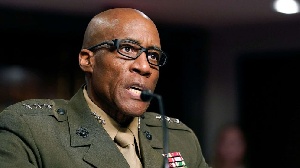- Home - News
- Elections 2024
- News Archive
- Crime & Punishment
- Politics
- Regional
- Editorial
- Health
- Ghanaians Abroad
- Tabloid
- Africa
- Religion
- Photo Archives
- Press Release
General News of Monday, 2 June 2025
Source: www.ghanawebbers.com
U.S. Military Chief urges African-led security response to expanding terror threat
General Michael E. Langley, the Commander of U.S. Africa Command (AFRICOM), has called for a unified, African-led security approach. He aims to counter the growing threat of terrorism across Africa.
Langley warned that extremist networks are advancing toward West Africa’s coastal nations, including Ghana. He emphasized the urgent need for coordinated regional action. “African militaries are not waiting to be saved,” he stated.
He noted that countries like Ghana, Côte d’Ivoire, and Benin are on the frontlines against violent extremism. “One of the terrorists’ new objectives is gaining access to West Africa’s coasts,” he cautioned.
Speaking at a virtual press briefing after the Africa Chiefs of Defense Conference in Nairobi, Langley highlighted African-led solutions in combating terrorism. The conference included senior military leaders from over 37 African nations for important discussions on long-term strategies.
AFRICOM is headquartered in Stuttgart, Germany and oversees all U.S. military operations in Africa. Langley emphasized empowering African partners through capacity building and institutional support.
“This means tackling instability locally through intelligence sharing and community strength,” he explained. He added that militaries must integrate deeply into society for lasting safety and prosperity.
Langley commended Ghana’s efforts against terrorist expansion. He noted that Ghana, Côte d’Ivoire, and Benin are fighting fiercely along their northern borders to prevent this threat.
To support these efforts, AFRICOM prioritizes readiness for independent operations and regional military exercises. Langley cited “Justified Accord” as a model of successful collaboration among East African nations.
He also addressed the worsening crisis in the Sahel region, calling it the “epicenter of terrorism.” Mali, Burkina Faso, and Niger face daily threats from ISIS and al-Qaida affiliates.
“In Burkina Faso especially, the government has lost control of large territories,” he added. He expressed concern about attacks in the Lake Chad region and sophisticated extremist networks targeting coastal areas.
Regarding AFRICOM's counterterrorism operations in East Africa, Langley revealed over 25 airstrikes have been conducted in Somalia this year—double last year's total. “The U.S. is actively pursuing jihadists,” he said.
Langley praised Africa’s youth for their energy and innovation during his visit to Algeria. He met a robotics team using technology to solve local challenges.
“That shows African innovation will be a force for stability,” he said as he nears the end of his tenure as AFRICOM commander.
He reaffirmed U.S. commitment to long-term partnerships across Africa: “It’s about empowering African nations to solve their own problems.”
“A safe, stable, and prosperous Africa is not just a charitable goal; it’s a strategic necessity,” he concluded.











